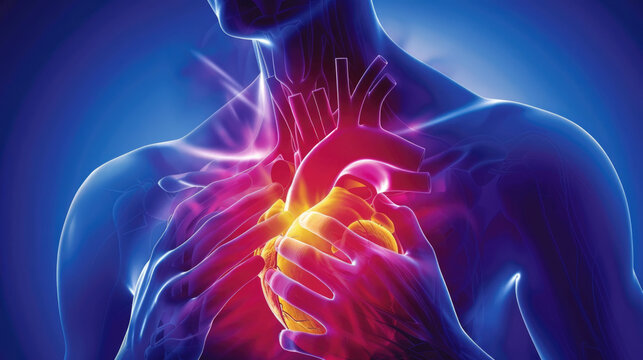Understanding Angina: Symptoms, Diagnosis, and Types
Angina is a type of chest pain caused by reduced blood flow to the heart muscle due to narrowing or blockages in the blood vessels around the heart. While angina itself is not life-threatening, it can indicate an increased risk of more serious heart conditions, such as a heart attack.
Symptoms of Angina
The primary symptom of angina is chest pain, which may present as:
- A dull pain, ache, or heavy, tight feeling in the chest
- Pain spreading to the arms, neck, jaw, or back
- Pain triggered by physical exertion
Warning Signs: Prolonged chest pain may be a sign of a heart attack. Call 999 immediately if you or someone else experiences:
- Central chest pain that does not go away, with pressure, tightness, or squeezing sensations
- Pain radiating down the left arm, both arms, neck, jaw, back, or stomach
- Loss of consciousness, seizures, or difficulty breathing
- Chest pain accompanied by breathlessness, nausea, or sweating
When to Speak to a GP:
- If you experience chest pain on exercise that eases with rest and do not have an angina diagnosis
- If you have a diagnosis of angina but symptoms are becoming more frequent or occur at rest
For urgent concerns outside GP hours, call 111.
Diagnosing Angina
To diagnose angina, your healthcare provider will assess your symptoms, ask about possible triggers, family medical history, and lifestyle factors such as smoking.
Tests for Angina
Tests may include:
- Weight and Blood Pressure Measurement
- Blood Tests: To check cholesterol levels, diabetes, or anemia
- Electrocardiogram (ECG): Measures heart rhythms and electrical activity
- Exercise Tolerance Test (ETT): Assesses heart activity during exercise
- Myocardial Perfusion Scan (MPS): Measures blood flow to the heart
- Coronary Angiography: Determines the severity of artery narrowing or blockages
- Troponin Blood Tests: Identify heart damage by measuring enzyme levels
Types of Angina
There are two main types of angina:
1. Stable Angina
This is the more common form of angina, where attacks are often triggered by physical activity or stress. Symptoms usually last for a few minutes and improve with rest or medication such as Glyceryl trinitrate (GTN).
2. Unstable Angina
Unstable angina is less predictable and may develop without clear triggers. Attacks often last longer and can persist even when resting. Because sudden chest pain can sometimes indicate either unstable angina or a heart attack, doctors may initially refer to this as Acute Coronary Syndrome (ACS) until further testing is completed.
Treating Angina: Medications, Management, and Surgical Options
Angina can be managed through a combination of lifestyle adjustments, medications, and, in some cases, surgical procedures. The treatment approach depends on whether you have stable or unstable angina and aims to reduce symptoms, prevent attacks, and lower the risk of serious cardiovascular events like heart attacks.
Treating Stable Angina
Stable angina typically occurs with physical exertion or stress and can be managed with medications to prevent and alleviate symptoms.
1. Medications for Preventing and Treating Angina Attacks
- Nitrates: Relax the muscles in blood vessels, allowing blood to flow more easily. Common forms include:
- Slow-release tablets
- Fast-acting spray or tablets (e.g., Glyceryl trinitrate (GTN)): Keep this with you at all times. If you experience an angina episode, use the spray or tablet under your tongue. If the pain persists after five minutes, repeat the dose. Call an ambulance if pain continues five minutes after the second dose.
- Beta Blockers: Help slow down the heart, reducing its demand for oxygen.
- Calcium Channel Blockers: Relax the arteries, improving blood supply to the heart muscle.
If beta blockers or calcium channel blockers are unsuitable, alternative medications may be recommended by your doctor.
2. Reducing the Risk of Heart Attack or Stroke
To lower the risk of severe cardiovascular issues, your doctor may prescribe:
- Low-dose Aspirin: Helps prevent blood clots.
- Statins: Lower cholesterol levels (blood fats).
- ACE Inhibitors: Reduce blood pressure.
Managing Unstable Angina
Unstable angina is less predictable, can occur at rest, and signals a potential acute coronary syndrome. Seek urgent medical attention by calling 999 if symptoms worsen suddenly.
Medications for Unstable Angina
Medications aim to prevent blood clots and reduce heart attack risk, including:
- Low-dose Aspirin
- Clopidogrel
- Ticagrelor
Surgical Options for Treating Angina
Surgery may be considered if medication alone does not control angina attacks or if tests show a high risk of heart attack.
1. Coronary Artery Bypass Graft (CABG)
CABG involves taking a section of a blood vessel from another part of the body to bypass a blocked or narrowed artery, restoring blood flow to the heart.
2. Percutaneous Coronary Intervention (PCI)
Also known as coronary angioplasty, PCI involves widening a narrowed artery using a balloon and placing a tiny tube called a stent to keep the artery open.
Continuing Care After Surgery
Following surgery, you may need to continue taking medications to manage your condition and reduce the risk of further heart issues. Discuss the best treatment options and long-term management plan with your doctor.







